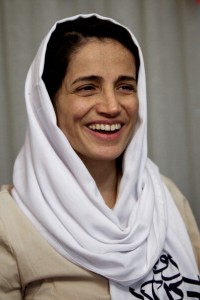
How many human rights activists does it take to achieve human rights victories in Iran?
The answer is a lot and they have to be persistent over a long period of time. But in the end, all the hard work does pay off as we have seen over the past several weeks.
On September 18, Iran released prominent human rights attorney Nasrin Sotoudeh, who had been in prison for three years just for representing her clients – many of them young people sentenced to death and human rights defenders such as Nobel Peace Laureate Shirin Ebadi.
There are also indications that a man known as “Alireza M” – who had been subjected to a botched execution, had been declared dead and who was then discovered to be alive in the morgue the next day – will not have to face the horrific prospect of a reattempt of his execution.
Other positive signs include an announcement from Iran’s Minister of Culture Ali Jannati that censorship of books will be eased and a call from President Hasan Rouhani for the lifting of restrictions on academic freedom and for allowing Iranian scholars more opportunity to take part in international conferences.
And on Monday, October 21, well-known student activist and prisoner of conscience Majid Tavakkoli, who had been in prison since his arrest in December 2009 and who had been suffering from numerous serious health problems due to the wretched conditions at Raja’i Shahr Prison, was released on medical furlough.
Many commentators have attributed the spate of good news to efforts made by the new President Rouhani (some would say sincere, others would say cynical) to improve Iran’s public image as the country embarks on a new round of negotiations to address the nuclear issue and easing of punitive sanctions.
When there have been victories, it has been on cases that have generated the most activism and the loudest outcry from the most people.
Over the years, many Amnesty members and other activists would ask me whether their signature on a petition, their letter to an Iran government official, or their attendance at a rally would really make a difference, in the grand scheme of things. And I have always believed, and am more convinced now than ever, that the answer is a resounding YES!
To all those wonderful men who posted photos of themselves on the internet, wearing Iranian women’s dress in solidarity with Majid Tavakkoli (whom authorities tried to humiliate by dressing him as a woman after his arrest and publicizing the photo); to all the Amnesty and United4Iran activists who took part in our Azadi (Freedom) Square action; to all the hundreds of caring people who sent Nowruz (Iranian New Year) greetings to Majid; to the Amnesty student groups who worked so diligently on Majid Tavakkoli’s case when he was the Amnesty USA western region’s special focus case – I firmly believed it is because of your unfailing efforts and passionate commitment that Majid is resting with his family at home right now.
There are many challenges to come. As the U.N. Special Rapporteur on the Situation of Human Rights in Iran, Ahmed Shaheed’s latest report makes clear, the Iranian authorities need to implement numerous fundamental changes to adhere to internationally accepted human rights standards. And the Iranian authorities’ response to the latest report is just a retread of the same tired old rhetoric with which all the previous reports have been greeted. Instead of boring us, the Iranian government needs to permit Mr. Shaheed to conduct a research mission in Iran.
Meanwhile, I know our activists will continue to press the Iranian authorities – for instance on the case of two brothers, journalists and members of Iran’s Kurdish minority – accused of vaguely worried national security offenses which could result in harsh sentences. Remember – when there have been victories, it has been on cases that have generated the most activism and the loudest outcry from the most people.
